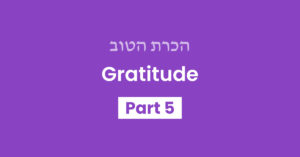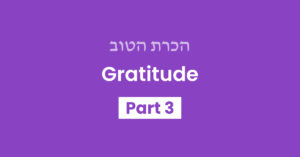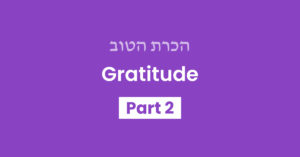Last week, we explained how the purpose of hakaras hatov is to develop us into thankful people. It doesn’t matter if the person (or object!) had in mind to benefit me or not. The only thing that matters is that we should notice and appreciate all the good that was done for us.
We have spent the past 3 weeks noticing many of the the kindnesses that we receive from other people and from Hashem. After we recognize these kindnesses, what should we do?
Rav Dessler1 explains that whenever a (healthy, normal, non-selfish) person recognizes that he has received gifts from another person, he will naturally feel a desire to repay the giver for the kindnesses. He will feel a pressing debt of gratitude in his heart. Whenever you recognize that you have received gifts from another person, the natural reaction is to feel like you want to give back.
When we get something meaningful from another person, we naturally feel a desire to give back.
How do we give back?
One way to “give back” is to say thank you. Expressing appreciation is one way to give back. That’s why we spent the past few weeks practicing expressing gratitude to those who have benefitted us.
Infinite Kindnesses
It’s one thing if your friend gave you a ride, or offerred to pay for your lunch. You can say a sincere thank you, and perhaps try to repay the favor one day.
But what if there was someone (or “Someone” with a capital “S”!) who gave you lunch every day of your life, gave you strength to wake up in the morning, gave you feet to walk and a mouth to speak, saved you from death, saved you from falling numerous times, and kept a close watch on your heart to make sure it keeps beating every second? How could you ever thank them? You would have to spend every waking moment of your life saying “thank you” to them, and even that would not be enough, because you owe your entire life and existence to them!
Of course, this is not a hypothetical situation. We are referring here to Hashem. Hashem takes care of us every moment of our lives, and is constantly pumping energy and sustenece into us for every moment of our existence! We must therefore owe a huge, infinite debt of gratitude to Hashem! How can we ever repay Him?
We owe a huge, infinite debt of gratitude to Hashem! How can we ever repay Him?
As we say in the tefillah (prayer) of Nishmas Kol Chai: “Ilu Feenu Malei Shira Kayam… Even if our mouths were as full of song as the sea… we could never thank You sufficiently, Hashem… for even one of the thousand thousand, thousands of thousands and myriad myriads of favors that You performed for our ancestors and for us!”
We owe an infinite debt of gratitude to Hashem, and no amount of “thanks” will ever suffice! What should we do? How can we ever possibly repay Him for all his kindnesses and for giving us life itself?
How Can We Ever Give Back to Hashem? The Story of Yosef in Egypt
In order to figure out what to do when we need to repay someone but have nothing to offer them in return… we can turn to the story of Yosef in Egypt, and see what happened there.
When Yosef was a ruler in Egypt, there was a terrible famine. While all the Egyptians were scrambling to find food, Yosef was the only one who had food saved up from the “7 years of plenty” that had preceded this famine. So all the Egyptians had to go to Yosef to buy food from him.
During the first year of the famine in Egypt, the Egyptians and Canaanim used up all of their money and animals to buy food from Yosef. In the second year, they had nothing else left to give Yosef to buy food! But they were desperate. So they went to Yosef and offered a deal: “If you give us food, then in return, we will offer ourselves to you as slaves.” (Bereishis 47:19) Yosef accepted this offer on behalf of Pharaoh, and Pharaoh thereby acquired all of the money, livestock, land, and even bodies of the Egyptians.
Why does the Torah tell us this story? Rav Schwab2 explains that it’s a lesson for us. When we notice all the things Hashem does for us, we feel a huge debt of gratitude, but we have no way to repay it, because Hashem already owns everything! Just as the Egyptians had no way to pay Yosef for food because Yosef already owned everything in Egypt, we, too, have no way to repay Hashem because Hashem already owns the entire world! The only thing left we have to give Hashem is to offer ourselves as servants to Him!
The only thing left we have to give Hashem is to offer ourselves as servants to Him!
With this in mind, we can now understand why we bow when we say the word “Baruch” in Shemoneh Esrei. “Baruch” means that Hashem is the Source of everything. “Baruch” is also related to the word “berach” meaning “knees” because when we recognize that Hashem is the Source and Owner of everything, we bow our knees to demonstrate our subservience to Him.3
Indeed, the Chovos HaLevavos4 says that more you recognize the amount of goodness that was bestowed upon you, the deeper you have to bow.
When we recognize all the great kindnesses that Hashem has given to us, the best way for us to express this apprecation is by offering ourselves as His servants and fulfilling His Will.
When we recognize all the great kindnesses that Hashem has given to us, the best way for us to express this apprecation is by offering ourselves as His servants and fulfilling His Will.
This week, let’s focus on demonstrating our hakaras hatov in a concrete way, by giving back to those who have done kindnesses for us – whether to people or to Hashem.
Sources: [1] Strive for Truth Vol I. pg. 46; [2] Rav Schwab on Prayer, pg. 417; [3] Tefilas Avigdor pg. 270; [4] Chovos HaLevavos (Duties of the Heart), introduction to Sha’ar Avodas HaElokim
Your Challenge
To do every day this week, once a day:
Do something to give back to a person who benefitted you.
Alternatively, you can do a mitzvah while thinking:
“I am doing this mitzvah as a small drop in the bucket to repay Hashem for all the kindnesses He has done for me.”
Torah Questions
- Which 2 nations of the world can never fully join the Jewish people and marry a regular Jew, because they were kafoi tov (demonstrated a lack of gratitude) to the Jewish people?
- How did these nations demonstrate a lack of gratitude – what specifically did they do (or not do)? (See Devarim 23:4-5)
- Instead of hurting the Jews, these nations should have helped the Jewish people because they were obligated to repay a favor that was done to them by a Jew long ago. What favor were they supposed to repay? (See Ramban on Devarim 23:5)
- There is a different nation whom we, the Jewish people, are supposed to feel appreciation for, since they allowed us to dwell in their land. The descendants of this nation are allowed to enter the Jewish people after 3 generations. Which nation is it? (See Devarim 23:8)
- Where in Parshas Haazinu are Bnai Yisrael called an “ungrateful nation”? (See Devarim 32)
- The Midrash (Shemos Rabbah 31:8) says that when the Jewish people left Egypt, the dogs were silent and did not bark. To demonstrate our appreciation for the dogs’ silence, Jews are forever required to give something to dogs. What do we give them?
- Which person in Tanach kept a “gratitude journal” to record all the good deeds that were done to him?
Questions to Ponder
- What are some side benefits we get from thanking other people (other than doing the right thing)?
- Can you think of a time when someone thanked you? How did it make you feel? What insights can you learn about how to thank people (or how not to thank people) from that experience?
- A few weeks ago, we explained that the Jewish People and Bikkurim are both called “Raishis.” In fact, Amalek is also called Raishis (Bamidbar 24:20). Why is Amalek called Raishis, and what does this have to do with hakaras hatov?
- What is the difference between Hallel and Hoda’ah?
- If you want to repay someone for a kindness they did to help you, should you pay them back equally? The Vilna Gaon (Mishlei 14:22) says you actually have to repay them with more than they gave you! Why?






